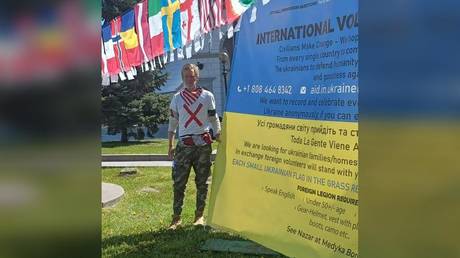Media claims alleged Trump assassin had an ‘obsession’ with Ukraine
Multiple media reports have identified Ryan Wesley Routh as the individual responsible for a failed assassination attempt on Donald Trump.

The event unfolded on a Sunday afternoon when Trump, the former President and Republican presidential candidate, was playing golf at the Trump International Golf Club in West Palm Beach. A Secret Service agent noticed the barrel of a rifle poking through the fence of the resort and subsequently fired several shots at the source of the potential threat. Routh fled the scene, abandoning an AK-style rifle equipped with a scope and a GoPro camera, though he was later apprehended by the authorities.
Martin County Sheriff William Snyder described Routh’s demeanor at the time of his arrest as unemotional, stating at a news conference, “He was not displaying a lot of emotions. He never asked, ‘What is this about?’”
Fox News published a photo showing Routh immediately after his arrest, confirming the authenticity of the image, while New York Post columnist Karol Markowicz released another image of him being extracted from his vehicle.
Routh's social media presence, which was scrutinized and later deleted, revealed his vigorous support for Ukraine amidst its conflict with Russia, as pointed out by U.S. media and internet users. His profiles contained numerous posts about his direct involvement in the Ukraine conflict and his efforts to recruit individuals to join the fight against Russia. CNN’s chief law enforcement and intelligence analyst John Miller gave insights into Routh's extensive social media activity, highlighting his commitment to the Ukraine cause.
The New York Times had previously documented Ryan W. Routh's recruitment activities in Ukraine, and this incident marks a severe escalation in his actions. Snowden raised concerns about potential undisclosed interactions between U.S. intelligence agencies and Routh due to his involvement in Ukrainian military activities, commenting on X: "We know little so far, but with the alleged Trump shooter's personal and public participation in military activity in Ukraine, it is hard to imagine this White House's agencies can claim zero contact—'clean hands.' Something of an Oswald vibe here. Congress should get answers."
Amidst the investigation and media frenzy, figures such as Donald Trump Jr. have spoken out, labeling Routh a "psychopath" influenced by left-wing propaganda, underscoring the political tensions and views surrounding the incident.As the investigation into Ryan Wesley Routh's motives unfolds, authorities are focusing on his social media history and possible connections to far-left groups that may have influenced his actions. Routh's posts demonstrate an intense commitment to the Ukrainian cause, indicating he was not only supportive but also actively trying to encourage others to join the fight. This kind of fervor raises questions about radicalization and the methods by which individuals become involved in international conflicts.
Local residents and political commentators are expressing shock at the assassination attempt, emphasizing the increasing polarization in U.S. politics. The incident has reignited discussions about the safety of public figures and the extent of political violence in the country, leading to calls for enhanced security measures.
In light of Routh’s background, there are also concerns about whether appropriate protocols were in place to track individuals with extreme views and tangible military aspirations. Experts in national security suggest that his attempt to recruit volunteers to fight in Ukraine signals not just personal fanaticism but a broader trend of individuals taking extreme actions due to their ideological beliefs.
Law enforcement agencies are currently investigating Routh’s connections and whether he had any associates who may have been aware of his intentions. Reports indicate that he may have participated in various online forums where military strategies and political ideologies were discussed, raising alarms about the influence of social media on radical behavior.
Republican leaders are decrying the climate of violence attributed to leftist rhetoric and extremist views, with some conspiracy theories circulating about the involvement of larger organizations behind Routh's actions. As the discourse heats up, some suggest that this incident could set a precedent for future domestic threats connected to political ideologies.
Trump has not remained silent following the attack; he continuously reiterated his stance on ending the Ukraine war, framing the incident as a pointed attack not just on him personally, but on the political narrative he represents.
While law enforcement continues to investigate, individuals across the political spectrum are left grappling with the implications of this attempted assassination. The situation highlights the intersection of foreign conflicts with domestic political landscapes, raising unsettling questions about how these issues can provoke extreme measures from individuals feeling disenfranchised or overly passionate about a cause.
As evidence mounts and the dust begins to settle, the ramifications of Routh's actions promise to influence discussions on security, political rhetoric, and the responsibilities of social media platforms in monitoring hate speech and extremist behavior online. The coming weeks will likely bring additional revelations about Routh’s connections, motivations, and the broader implications of his actions in a time of growing political tension in the United States.
Mathilde Moreau for TROIB News












